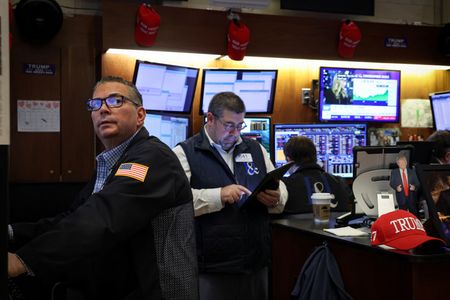By Chris Prentice and Greta Rosen Fondahn
(Reuters) – European shares slipped on Friday, while Wall Street opened with muted gains following in-line U.S. inflation data that reinforced bets the Federal Reserve could cut interest rates twice this year.
Oil prices were on track for their first monthly decline since November. [O/R]
World stocks fell, with MSCI’s gauge of stocks across the globe down 0.09% at 856.46.
Crypto prices tumbled as the Trump-fuelled boom fizzled.
The 12-month change in the U.S. personal consumption expenditures (PCE) price index ticked down to 2.5% last month from 2.6% in December, the Commerce Department’s Bureau of Economic Analysis showed.
The core PCE measure, which excludes volatile items such as food and energy and is the Fed’s preferred measure of inflation, fell to 2.6% from an upwardly revised 2.9%. The central bank targets an inflation rate of 2%.
Both measures came in line with economists’ expectations.
The threat of escalating tariffs has boosted the dollar, but it has also stoked worries about the impact of widespread duties on the U.S. economy.
Recent U.S. data has been soft, and traders have reacted by pricing in more policy easing from the Fed.
On Friday, markets were pricing in 61 basis points of further rate cuts this year, but the first rate cut is not fully priced in until July, according to LSEG data.
“The inflation numbers still remain elevated, although they came in within expectations, but on a year-to-year basis there was a slight relief from the previous reading, but the report indicates that inflation remains sticky,” said Peter Cardillo, chief market economist at Spartan Capital Securities.
“That means the pause will continue. And that means that the Fed may have a dilemma on its hands because the recent macro numbers are cooling and it shows signs of the economy cooling.”
On Wall Street, the Dow Jones Industrial Average rose 212.48 points, or 0.49%, to 43,449.49, the S&P 500 climbed 28.41 points, or 0.47%, to 5,889.15 and the Nasdaq Composite was up 101.97 points, or 0.55%, at 18,646.30.
The pan-European STOXX 600 index fell 0.16%, while Europe’s broad FTSEurofirst 300 index slipped 3.63 points, or 0.16%
The dollar index, which gauges the greenback against six major peers, was down 0.06% to 107.29.
The prospect of higher U.S. tariffs sent jitters through markets and revived concerns about an escalating global trade war.
U.S. President Donald Trump said on Thursday that 25% duties on imports from Canada and Mexico will come into effect on March 4 – not April 2 as he had suggested a day earlier – and said goods from China will be subject to an additional 10% duty. This week he also floated 25% tariffs on shipments from the European Union.
Bitcoin dipped below $80,000 for the first time in more than three months and was last down 0.55% at $83,827.16.
U.S. Treasury yields dropped after the U.S. data, leaving the yield on benchmark 10-year notes down 3.5 basis points at 4.252%.
The 2-year note yield, which typically moves in step with interest rate expectations for the Federal Reserve, fell 3.3 basis points to 4.047%.
Spot gold dropped 1.22% to $2,841.50 an ounce.
MSCI’s broadest index of Asia-Pacific shares outside Japan closed 2.45% lower at 576.86, while Japan’s Nikkei fell 1,100.67 points, or 2.88%, to 37,155.50.
(Reporting by Greta Rosen Fondahn; additional reporting by Stephen Culp; Editing by Timothy Heritage, Andrew Heavens and Susan Fenton)











